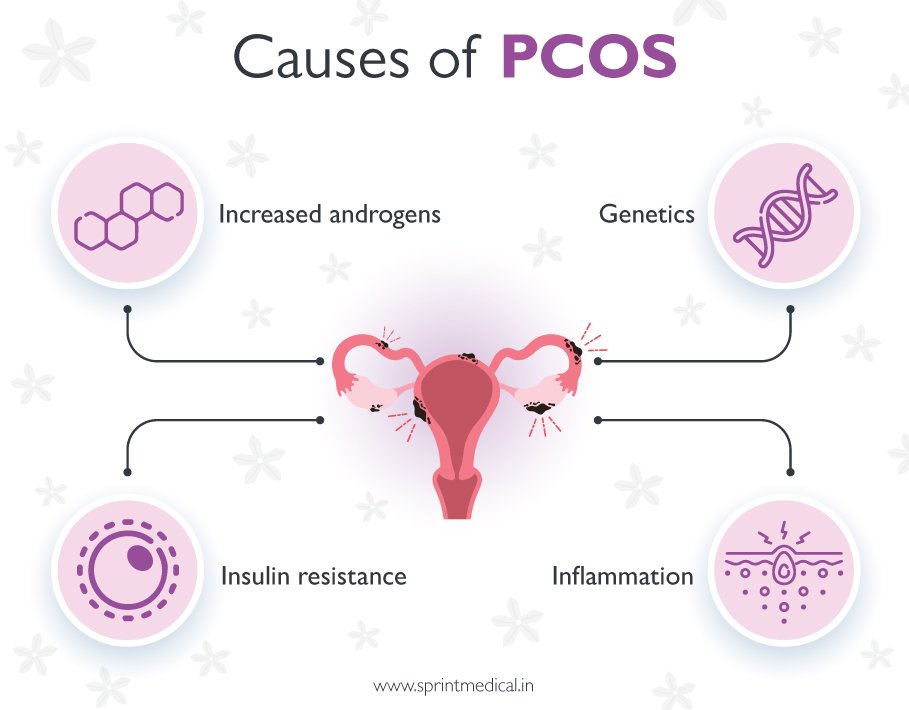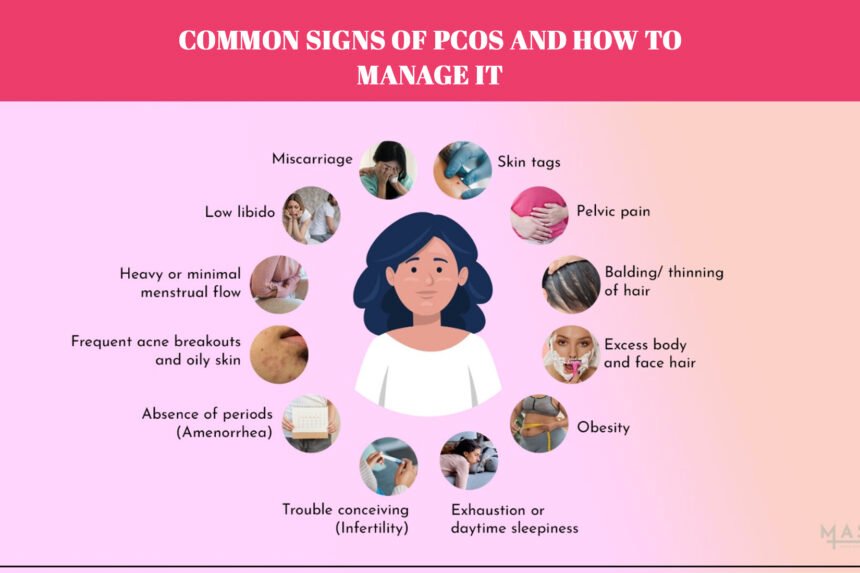Polycystic ovary syndrome (PCOS)

Polycystic ovary syndrome (PCOS) is a hormone issue that affects women during their childbearing years. With PCOS, your periods might come rarely or not at all. Sometimes, they can go on for too many days. It can also mean having higher levels of a hormone called androgen in your body.
In PCOS, lots of tiny fluid pouches, known as cysts, form along the ovary’s edge. These little sacs hold eggs that aren’t fully grown yet, called follicles. Normally, these follicles don’t release eggs on a regular schedule. Doctors aren’t sure what exactly causes PCOS. Catching it early and starting treatment, plus losing some weight, can help prevent serious problems later, like type 2 diabetes or heart trouble.
What Causes PCOS?

Experts haven’t pinned down the exact reason PCOS happens. They think it’s tied to higher levels of male hormones, like androgen, which stop the ovaries from working properly and releasing eggs as they should.
Things like family history, trouble with insulin, and body inflammation seem to play a role in creating too much androgen.
Family History (Genes)
Research shows PCOS tends to show up in families—if your mom or sister has it, you might too. It’s not just one gene causing it; doctors believe a bunch of genes team up to make PCOS happen.
Insulin Resistance
About 70% of women with PCOS struggle with insulinresistance, which means their bodies don’t use insulin well. Insulin is a hormone made by the pancreas that helps turn food sugar into energy. When insulin doesn’t work right, the body asks for more of it. The pancreas pumps out extra insulin to keep up, and this boost pushes the ovaries to make more male hormones. Being overweight can make insulin resistance worse, and both can raise your chances of getting type 2 diabetes down the line.
Inflammation
Women with PCOS often have more inflammation in their bodies than usual. Carrying extra weight can add to this inflammation. Studies suggest that too much inflammation can crank up androgen levels, making PCOS symptoms tougher.
Symptoms of PCOS

Polycystic ovary syndrome (PCOS) symptoms often show up when a girl gets her first period, usually in her teens. However, for some, these signs might pop up later, even after having regular periods for a while. PCOS affects everyone differently, and no two cases are the same.
Irregular Periods: Your periods might not come often or follow a steady pattern. Some women have long periods that drag on for days, while others get fewer than nine periods in a year, with gaps of more than 35 days between them. This irregularity can also make it harder to get pregnant.
Too Much Androgen: This hormone can cause extra hair to grow on your face, chest, back, or other areas—a condition called hirsutism. High androgen levels might also lead to stubborn acne or even hair thinning on your head, similar to what some men experience.
Polycystic Ovaries: Your ovaries may grow larger than usual and develop many small sacs, or follicles, around their edges. These follicles hold immature eggs and often don’t release them properly, which can mess with how your ovaries work.
More Signs of PCOS
Missing or Irregular Periods: Some women skip periods entirely, or their cycle is all over the place.
Trouble Getting Pregnant: Since ovulation (releasing an egg) doesn’t happen regularly, or at all, it can be tough to conceive.
Extra Hair Growth: You might see more hair on your face, chest, back, or buttocks because of those higher androgen levels.
Weight Gain: Putting on extra pounds is common with PCOS.
Hair Loss: Your hair might thin out or fall from the top of your head.
Oily Skin or Acne: Your skin could get greasy, and pimples might become a regular problem.
How PCOS Impacts Your Body

When your body has more male hormones, like androgen, than usual, it can mess with your ability to have a baby and affect other parts of your health.
Trouble Getting Pregnant (Infertility)
To conceive, your ovaries need to release an egg each month—a process called ovulation. If PCOS stops this from happening regularly, fewer eggs are available to be fertilized. That’s why PCOS is a top reason many women struggle to get pregnant.

Metabolic Syndrome

Up to 80% of women with PCOS carry extra weight or are obese. This, along with PCOS itself, can raise your chances of having high blood sugar, high blood pressure, low “good” HDL cholesterol, and high “bad” LDL cholesterol. Together, these issues are known as metabolic syndrome, which can lead to serious problems like heart disease, diabetes, or even a stroke.
Sleep Apnea
This is when your breathing stops and starts while you sleep, keeping you from resting well. Women who are overweight, especially those with PCOS, are more likely to have sleep apnea. If you have both obesity and PCOS, your risk jumps 5 to 10 times higher than women without these conditions.

Endometrial Cancer

Normally, when you ovulate, the lining of your uterus sheds during your period. But if ovulation doesn’t happen monthly with PCOS, that lining builds up over time. A thicker lining can increase your risk of developing endometrial cancer, which affects the uterus.
Depression
The hormone shifts and tough symptoms—like extra facial hair—can take a toll on how you feel. Many women with PCOS end up dealing with anxiety or depression because of these changes.

How Doctors Figure Out If You Have PCOS

Doctors usually say you have PCOS if you show at least two of these three signs: high levels of male hormones, periods that don’t come on time, or cysts on your ovaries. They’ll also ask about things like acne, extra hair growth on your face or body, and any weight changes you’ve noticed.
Exams and Tests
Pelvic Exam: Your doctor will gently check inside your vagina with gloved fingers to feel for anything unusual in your ovaries or uterus, like growths.
Blood Tests: These look for extra male hormones and can also check your cholesterol, insulin, and triglyceride levels to spot risks for heart disease or diabetes.
Ultrasound: This test uses sound waves to peek at your ovaries and uterus, searching for cysts or other issues.
Diet and Lifestyle Tips to Manage PCOS
Managing PCOS often begins with simple changes to your daily habits, like
- Shedding some weight, eating better, and staying active.
- Dropping just 5 to 10 percent of your body weight can make a big difference—it can help your periods come more regularly and ease PCOS symptoms. Plus, losing weight can improve your cholesterol, bring down insulin levels, and cut your chances of heart problems or diabetes.
- Any eating plan that helps you slim down can improve PCOS, but certain diets might work better than others.
- Research shows that cutting back on carbs can help you lose weight and lower insulin, which is great for PCOS.
- A low glycemic index (low GI) diet—where you get most of your carbs from fruits, veggies, and whole grains—can do a better job of fixing your menstrual cycle compared to a standard weight-loss plan.
- Studies suggest that doing 30 minutes of medium-effort exercise, like brisk walking, at least three times a week can help women with PCOS shed pounds. Exercise also boosts ovulation and keeps insulin in check.
- Pairing exercise with a smart diet works even better. Together, they help you lose more weight than just one or the other while also lowering your risk of diabetes and heart issues.
Some early findings hint that acupuncture might ease PCOS symptoms, but scientists need to dig deeper to be sure.
Common Medical Treatments for PCOS

Doctors often use birth control pills and other medicines to help fix irregular periods and tackle PCOS symptoms like extra hair growth or acne.
Birth Control Options
Taking a hormone called progestin every day can:
- Balance out your hormones to a healthy level.
- Get ovulation back on track.
- Ease issues like unwanted hair sprouting up.
- Lower your risk of uterine cancer. You can take these hormones as a pill, wear them as a patch, or use a vaginal ring—whatever works best for you.

Metformin

Metformin, a medicine usually for type 2 diabetes (sold as Glucophage or Fortamet), also helps with PCOS by making insulin work better in your body. Research shows that pairing metformin with healthy eating and exercise can boost weight loss, cut blood sugar, and bring periods back to normal—better than just diet and exercise alone.
Clomiphene
Clomiphene (known as Clomid) is a fertility pill that can help women with PCOS conceive. Just a heads-up if you’re thinking about starting a family—it can raise your odds of having twins or even more babies at once.

Hair Removal Solutions

There are ways to deal with extra hair you don’t want. Or you can try laser hair removal or electrolysis to zap away hair from your face or body for good.
Surgery
If other treatments don’t help with fertility, surgery might be an option. A procedure called ovarian drilling uses a laser or a small heated needle to poke tiny holes in the ovary, which can kickstart regular ovulation.

When to Visit a Doctor for PCOS

Reach out to your doctor if:
Your periods keep skipping, but you’re sure you’re not pregnant.
You notice PCOS signs, like extra hair popping up on your face or body.
You’ve been trying to conceive for over a year without luck.
You spot diabetes warning signs, like feeling super thirsty or hungry, seeing blurry, or losing weight for no reason.
If your periods are already irregular or gone, and you want to get pregnant, don’t wait a full year—see a specialist right away to get checked out.
Also, remember: missing periods doesn’t mean you can’t get pregnant, even with PCOS—it’s not a substitute for birth control.
You could still conceive, so if you’re not planning for a baby, use protection just to be safe.
If you’ve been diagnosed with PCOS, make it a habit to see your regular doctor often. They’ll run tests to watch for things like diabetes, high blood pressure, or other health risks that can come with it. PCOS can throw off a woman’s periods and make it trickier to have a baby. Too many male hormones, like androgen, can also cause things like extra hair showing up on the face or body. Doctors usually start by suggesting lifestyle changes to manage PCOS, and these steps often do the trick. Losing weight can ease PCOS symptoms and boost your chances of getting pregnant. Eating smart and doing activities like walking or jogging are great ways to drop those pounds. If lifestyle tweaks aren’t enough, medicines can step in. Options like birth control pills or metformin can help get your periods back on track and calm down PCOS symptoms.










